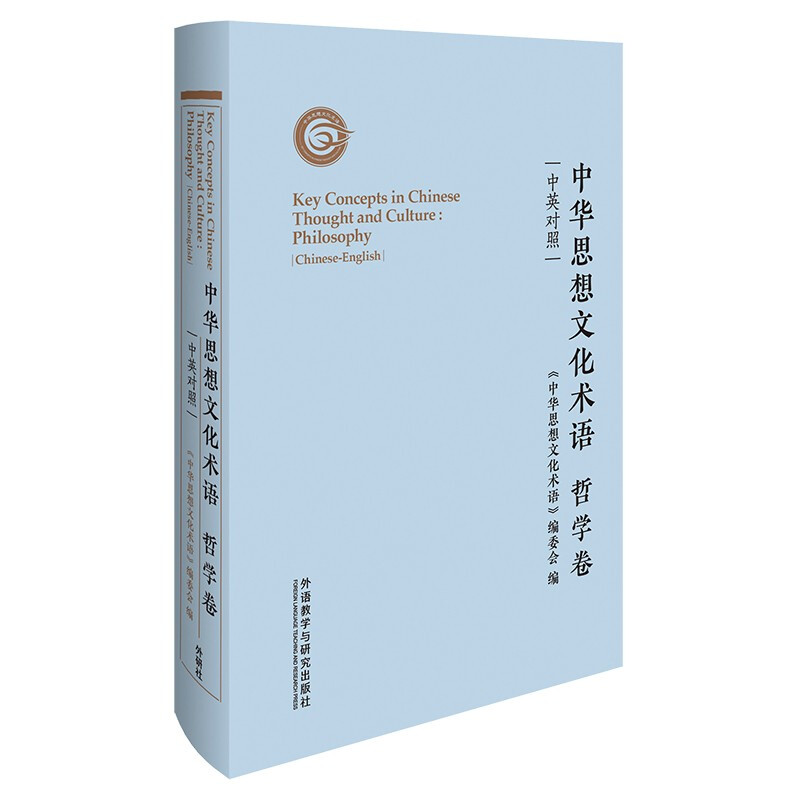- ISBN:9787521325447
- 装帧:一般纯质纸
- 册数:暂无
- 重量:暂无
- 开本:32开
- 页数:409
- 出版时间:2021-05-01
- 条形码:9787521325447 ; 978-7-5213-2544-7
本书特色
适读人群 :高中及以上中华思想文化术语是中华优秀传统文化的思想精粹。准确表达中华思想核心概念,推进中华思想文化术语传播,是维护文化主权、增强文化自信、促进文化交流的重要途径。 《中华思想文化术语:哲学卷(中英对照)》收录322条哲学类中华传统思想文化核心词;中英双语对照,释义正本清源,译文专业权威;是理解传统文化、阅读文史经典、学术典籍翻译、对外汉语教学的**之书。
内容简介
本书收录了322条哲学类的中华思想文化术语,以中英文双语的方式进行阐释。这些术语反映了中国传统文化特征和民族思维方式,体现了中国核心价值,编写者用易于口头表达、交流的简练语言客观准确地予以诠释,目的是在政府机构、社会组织、传播媒体等对外交往活动中,传播好中国声音,讲好中国故事,让世界更多了解中国国情、历史和文化。
目录
1 ānpín-lèdào 安贫乐道
Be Content with a Simple but Virtuous Life ………… 1
2 bāɡuà 八卦
Eight Trigrams ………… 2
3 bāyīn-kèxié 八音克谐
Harmonious Combination of Eight Sounds ………… 3
4 báimǎ féi mǎ 白马非马
A White Horse Is Not a Horse. ………… 5
5 bǎomín 保民
Protect the People ………… 6
6 bàofǎ-chǔshì 抱法处势
Upholding Law by Means of Power ………… 7
7 běnmò 本末
Ben and Mo (The Fundamental and the Incidental) ………… 8
8 běnwú 本无
Benwu (Original Non-being) ………… 10
9 biànhuà 变化
Change ………… 11
10 biémíng 别名
Distinct Name ………… 12
11 bōrě 般若
Prajna / Wisdom ………… 13
12 bóshī-jìzhòng 博施济众
Deliver Extensive Benefits to the People and Relieve the Suffering of the Poor ………… 14
13 bù’èr 不二
Advaya / Non-duality ………… 15
14 bùyánzhījiào 不言之教
Influence Others Without Preaching ………… 16
15 bùzhēnkōng 不真空
Emptiness as Non-substantiality ………… 17
16 cái 才
Talent / Capability / Attribute ………… 18
17 cānyàn 参验
Cross-checking and Verification ………… 20
18 cháng 常
Constant Laws of Nature ………… 21
19 chēngqíng-lìwén 称情立文
Establish Moral Standards in Keeping with Human Feelings ………… 22
20 chéngrén 成人
Complete Man ………… 23
……
141 qì 气
Qi (Vital Force) ………… 174
142 qìzhìzhīxìng 气质之性
Character Endowed by Qi (Vital Force) ………… 176
143 qì 器
Qi (Vessel) ………… 177
144 qiánshí 前识
Foreknowledge / Prophecy ………… 178
145 qián 乾
Qian ………… 179
146 qīnqīn 亲亲
Affection for One’s Kin ………… 180
147 qīnzhī 亲知
Knowledge from Personal Experience ………… 182
148 qíng 情
Qing ………… 182
149 qiónglǐ-jìnxìng 穷理尽性
Explore the Nature of All Things ………… 184
150 qióng zé biàn, biàn zé tōng, tōng zé jiǔ 穷则变,变则通,通则久
Extreme – Change – Continuity ………… 185
151 qiú fànɡxīn 求放心
Search for the Lost Heart ………… 186
152 rénfùtiānshù 人副天数
Humanity Should Be Aligned with Nature. ………… 187
153 rénlún 人伦
Human Relations ………… 189
154 rénxīn 人心
Human Heart / Human Desires ………… 190
155 rén 仁
Ren (Benevolence) ………… 192
156 rénzhèng 仁政
Benevolent Governance ………… 193
157 rúláizàng 如来藏
Tathāgatagarbha / Womb of the Tathāgata ………… 194
158 sānbiǎo 三表
Three Standards ………… 196
159 sāncái 三才
Three Elements ………… 197
160 sānjiè 三界
Traidhātuka / Three Realms of Existence ………… 199
……
301 zé 则
Rules ………… 367
302 zhèn 震
Zhen (Vibration) ………… 369
303 zhènɡmínɡ 正名
Rectification of Names ………… 370
304 zhènɡxīn 正心
Rectify One’s Heart / Mind ………… 371
305 zhīxínɡ 知行
Knowledge and Application ………… 372
306 zhīxínɡ-héyī 知行合一
Unity of Knowledge and Action ………… 374
307 zhīxiān-xínɡhòu 知先行后
First Knowledge, Then Action ………… 375
308 zhí 直
Rectitude ………… 377
309 zhìmínzhīchǎn 制民之产
Sustaining the People’s Livelihood ………… 378
310 zhì 智
Intelligence ………… 379
311 zhōngdào 中道
The Middle Way ………… 381
312 zhōnghé 中和
Balanced Harmony ………… 382
313 zhōngyōng 中庸
Zhongyong (Golden Mean) ………… 384
314 zhōnɡ 忠
Loyalty ………… 385
315 zhūzǐ-bǎijiā 诸子百家
A Hundred Schools of Thought ………… 386
316 zhūzǐxué 诸子学
Study of A Hundred Schools of Thought ………… 387
317 Zhuāng Zhōu mèng dié 庄周梦蝶
Zhuangzi Dreaming of Becoming a Butterfly ………… 388
318 zìrán 自然
Naturalness ………… 390
319 zìshēng 自生
Spontaneous Generation ………… 391
320 zōngjiào 宗教
Buddhist Teachings / Religious Sect ………… 392
321 zūn déxìng 尊德性
Revere One’s Virtuous Nature ………… 393
322 zuòwàng 坐忘
Forget the Difference and Opposition Between Self and the Universe ………… 394
附录 Appendices
中国历史年代简表 A Brief Chronology of Chinese History ………… 396
人名索引 Index of Names ………… 398
著作名索引 Index of Cited Works ………… 400
术语条目笔画索引 Concepts Listed in Order of Number of Strokes ………… 405
节选
天人合一/tiānrén-héyī/ Heaven and Man Are United as One. 一种认为天地人相通的世界观和思维方式。这种世界观旨在强调天地和人之间的整体性和内在联系,突出了天对于人或人事的根源性意义,表现了人在与天的联系中寻求生命、秩序与价值基础的努力。“天人合一”在历史上有不同的表现方式,如天人同类、同气或者同理等。如孟子(前372 ?— 前289)认为通过心的反思可以知性、知天,强调心、性和天之间的统一。宋儒寻求天理、人性和人心之间的相通。老子则主张“人法地,地法天,天法道”。根据对天和人理解的不同,“天人合一”也会具有不同的意义。 The term represents a world outlook and a way of thinking which hold that heaven and earth and man are interconnected. This world outlook emphasizes the integration and inherent relationship between heaven, earth, and man. It highlights the fundamental significance of nature to man or human affairs, and describes the endeavor made by man to pursue life, order, and values through interaction with nature. The term has different ways of expression in history, such as heaven and man are of the same category, sharing the same vital energy, or sharing the same principles. Mencius (372?-289 BC), for one, believed that through mental reflection one could gain understanding of human nature and heaven, emphasizing the unity of mind, human nature, and heaven. Confucian scholars of the Song Dynasty sought to connect the principles of heaven, human nature, and the human mind. Laozi maintained that “man’s law is earthly, earth’s law is natural, and heaven’s law is Dao.” Depending on a different understanding of heaven and man, the term may have different meanings. 引例 Citations: ◎以类合之,天人一也。(董仲舒《春秋繁露·阴阳义》) (以事类相合来看,天与人是一体的。) In terms of integration of categories, heaven and man are one. (Dong Zhongshu: Luxuriant Gems of The Spring and Autumn Annals) ◎儒者则因明致诚,因诚致明,故天人合一,致学而可以成圣,得天而未始遗人。(张载《正蒙·乾称》) (儒者则由明察人伦而通达天理之诚,由通达天理之诚而洞明世事,因此天与人相合为一,通过学习而可以成为圣人,把握天理而不曾遗失对人伦的洞察。) A Confucian scholar is sincere because of his understanding, and he achieves understanding because of his sincerity. That is why heaven and man are united as one. One can become a sage through studies, and master heaven’s law without losing understanding of man’s law. (Zhang Zai: Enlightenment Through Confucian Teachings)
作者简介
《中华思想文化术语》编委会由韩震等人组成。 韩震,北京师范大学学术委员会主任、教授。 袁济喜,中国人民大学国学院教授,中国人民大学孔子研究院学术委员,北京大学美学与美育研究中心客座教授。 王博,北京大学副校长、教授,北京大学儒学研究院院长、道家研究中心主任。 聂长顺,武汉大学中国传统文化中心教授、日本研究中心学术企划部部长。 黄友义,曾任国际翻译家联盟副主席、外文局副局长兼总编辑、中国翻译协会秘书长,现任中国翻译协会副会长、全国翻译资格(水平)考试英语专家委员会主任。
-

地心游记(纯英文)/床头灯英语.3000词读物
¥5.7¥15.8 -

Sons and Lovers
¥8.1¥26.0 -

你往何处去
¥11.2¥33.0 -

茶花女
¥3.7¥12.0 -

小妇人(纯英文)/床头灯英语.3000词读物
¥4.7¥15.8 -

了不起的盖茨比(纯英文)/床头灯英语.3000词读物
¥4.2¥12.8 -

流浪地球刘慈欣
¥16.7¥62.0 -

方法论
¥3.3¥9.5 -

本杰明:富兰克林自传
¥4.2¥13.5 -

企鹅口袋书系列·伟大的思想20:论自然选择(英汉双语)
¥6.3¥14.0 -

城堡
¥12.0¥26.0 -

巴黎圣母院
¥4.7¥15.5 -

命案目睹记
¥14.5¥33.8 -

THE GREAT GATSBY-了不起的盖茨比
¥5.0¥16.8 -

最新英汉百科图解词典-升级版
¥131.0¥168.0 -

沉思录
¥9.7¥21.0 -

英诗选译-孙大雨译文集-(英汉对照)
¥14.0¥36.0 -

考研英语背单词20个词根词缀
¥1.2¥3.2 -

英文疑难详解续篇
¥30.6¥45.0 -

查拉图斯特拉加是说
¥10.2¥29.0













